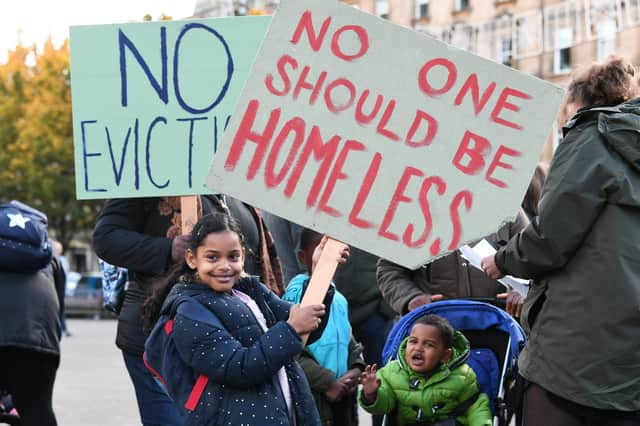Opinion: Campaigners galvanised by Suella Braverman’s rhetoric over tents on the streets


Amid the furore last week over Home Secretary Suella Braverman’s comments about rough sleeping being a “lifestyle choice”, some important observations could be made. One was the almost overwhelming pushback on the notion of homelessness being a lifestyle choice.
That came from politicians – including within the Conservative party – and from organisations like Crisis and others who immediately galvanised campaigners in response. With the proposal to ban charities from distributing tents subsequently not making it into the King’s Speech, it was clear that the collective voices decrying the plans were heard.
Advertisement
Hide AdAdvertisement
Hide AdThe second observation, from a Scottish perspective, is that this understanding of homelessness is not a current feature in Scottish politics. While very many differences of opinion abound across Scotland’s political parties, there remains broad consensus about the drivers and impacts of, as well as the solutions to homelessness.


Despite that, the truth is that levels of homelessness in Scotland are currently getting worse, not better, with increasing numbers of people rough sleeping and charities being forced into handing out sleeping bags because temporary accommodation is full. Scottish Government statistics published in August make for the starkest of reading.
30,000 households in Scotland’s homelessness system, the highest level since records began.
The number of homelessness applications and the number of households assessed as homeless at their highest level in over a decade, with the number of households being assessed as homeless rising 10 per cent on the previous year.
Over 15,000 households currently in temporary accommodation, a figure that includes almost 10,000 children.
Scotland has strong statutory rights for people facing homelessness. Unlike in England and Wales, there has been no distinction between “priority” and “non-priority” homeless people since 2012. This gives people in Scotland some of the strongest homelessness rights in the world and means that anyone who is homeless can go to their council to help and expect to be provided with somewhere to stay. And the strength of those rights is something we should all be proud of.
But those rights mean very little if Scotland’s local authorities, under-resourced and overwhelmed, are simply unable to meet the duties placed upon them. A report by the Scottish Housing Regulator earlier this year found that local authority homelessness services in Scotland – tasked with managing ever-increasing need at a time of seemingly ever-decreasing resources - were at risk of “systemic failure.”
And that is what is playing out across the country as local authorities – particularly in hotspots like Edinburgh, where the council recently formally declared a ‘housing emergency’ – find their ability to support people into safe, secure and settled homes becoming ever-diminished.
Advertisement
Hide AdAdvertisement
Hide AdYet it does not have to be like this. And we know what the solutions are to ensure not only that we stem the current rising tide of homelessness, but that we move closer towards ending homelessness in Scotland for good.
Over two years ago, plans were put forward by the Prevention Review Group – made up of homelessness experts, local authorities and people with experience of homelessness – for new homelessness prevention duties. These duties would require public bodies – like health, education and criminal justice – to ‘ask’ more routinely about people’s housing situations, and to ‘act’ if they identified a risk of homelessness.
The duties are expected to be included within the Scottish Government’s Housing Bill, due sometime in the first half of 2024. They could be, provided they are adequately resourced, genuinely transformational in putting prevention at the very heart of how we respond to homelessness.
In advance of that, the upcoming Scottish Government budget offers the opportunity to take more of the urgent action that we need, by committing to the building of more badly needed social homes and by ensuring that local authorities have the capability to meet their duties to support people facing or experiencing homelessness.
In 2018 the Homelessness and Rough Sleeping Action Group – established by the Scottish Government and comprised of experts from across the homelessness and housing sectors and beyond – published a detailed blueprint for ending homelessness in Scotland. It was a bold, ambitious and necessary plan for ending the injustice of homelessness across our communities, and it received overwhelming political support.
So we have the foundations and building blocks in Scotland to realise our shared vision of ending homelessness for good; the genuine cross-party support, the civil service expertise, the committed local authorities, the passionate and specialist third sector, and most importantly the collective knowledge of what the solutions are and what is needed to implement them.
But what these foundations and building blocks need is the cement to bind them together. That must come in the form of the ramping up of political commitment from the First Minister down, with the accompanying resources and investment needed to not just ease the immediate burden, but to put in place and resource the long-lasting change needed to see that everyone in Scotland has somewhere to call home.
In her comments of last weekend, the Home Secretary Suella Braverman was partially right about one thing. The existence of rough sleeping and homelessness is indeed about choice. But that choice is a political one. Do we choose to accept a situation in which so many of us are being pulled and locked into homelessness? Or do we choose to take the action needed to turn the page on homelessness in Scotland?
It should be no choice at all.
Neil Cowan is Head of Policy and Communications (Scotland), Crisis